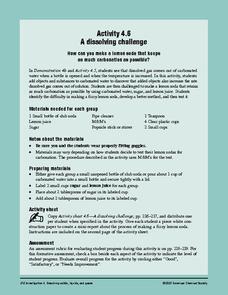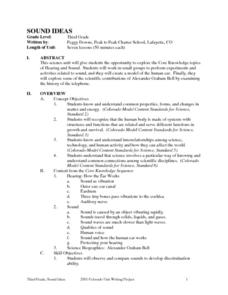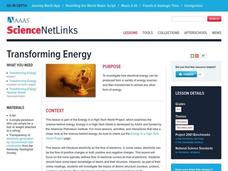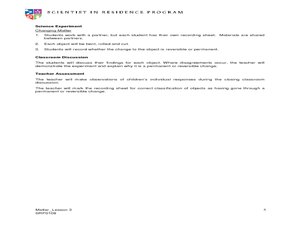American Chemical Society
A Dissolving Challenge
After collecting carbon dioxide bubbles from a cup of club soda, learners attempt to make their own lemon soda while preventing the loss of carbonation. They do so by creating a syrup before mixing the substances into the club soda....
Curated OER
Water and Ice
Students will work in small groups, observing an ice cube and recording a description, the feel of the ice, and how it looks when put in another container. Students observe changes in the ice over 15 minute intervals, then freeze the...
Urbana School District
Fluids
In 1879, Sir William Crookes discovered the fourth state of matter, plasma. The presentation covers states of matter, phase changes, density, pressure Pascal's Principle, buoyant force, Archimedes' Principle, Bernoulli's Principle,...
Curated OER
Chemistry Foundations
Extensive notes on foundational chemistry concepts make up this resource. It summarizes the properties of matter, the periodic table, chemical nomenclature, and general chemical bonding. Design a set reading comprehension questions to go...
Curated OER
Properties of Fresh and Sea Water
Learners work with three stations to demonstrate the properties of water. They explore water's boiling point, freezing point, and its ability to store heat.
Curated OER
Version 001 - Quiz 1
The phase diagram tops this chemistry quiz. Junior scientists answer eight multiple-choice questions as they analyze it and make calculations regarding the heat of vaporization.
National Weather Service
The Water Cycle
Looking for a full-color, labeled water cycle diagram? You found one! From evaporation to precipitation to plant uptake and everything in between, it's all here and beautifully illustrated.
American Chemical Society
Air, It's Really There
Love is in the air? Wrong — nitrogen, oxygen, and carbon dioxide are in the air. The final lesson plan in the series of five covers the impact of temperature on gases. Scholars view a demonstration of gas as a type of matter before...
American Chemical Society
Molecules Matter
Did you know that jumping spiders sometimes wear water droplets as hats? A seventh grade science lesson introduces the concept of what makes up water: tiny molecules that are attracted to each other. Starting with a chemistry discussion,...
Curated OER
Oobleck
Here is a good lesson which aptly describes how to do the classic "Oobleck" lab with your young scientists. Unfortunately, the "Oobleck Investigation Sheet" in the plan doesn't open. However, this is a very clear description about how to...
Curated OER
Energy and Matter
A review of a full unit on energy and matter, this slide show starts with basic definitions of states of matter and their mass. It then develops the ideas of the forces that that matter can exert. Details about bonding within matter and...
Cornell University
Glued into Science—Classifying Polymers
Explore the unique characteristics of polymers. A complete lesson begins with a presentation introducing polymers. Following the presentation, young scientists develop a laboratory plan for creating substances using polymers. They test...
Curated OER
Cold, Clouds, and Snowflakes
Students explore satellite data and graphing. In this weather data analysis math and science lesson, students analyze NASA satellite data to draw conclusions about geographical areas where precipitation might have happened. Students...
University of California
Hot! Hot! Hot!
Calories are not tiny creatures that sew your clothes tighter every night, but what are they? A science activity, presented at multiple levels, has learners experiment with heat, heat transfer, and graph the function over time. It also...
Curated OER
Sound and Frequency
Pupils pose their hypothesis, they ready their instruments, then record their observations. This is the science of sound lesson. They move through 5 stations, each focused on a different element of aspect of sound. Check this lesson out,...
Curated OER
Wipe Out
Learners examine the flow of water. They observe and test the properties of water by using sticks in flowing water. The lesson has streaming video, resource links to access, and a good hands-on activity that is clearly described in the...
Curated OER
Sound Ideas
Complete a unit of lessons on hearing and sound. Learners conduct sound experiments, research the history of the telephone and scientific contributions of Alexander Graham Bell, and create a model of the human ear.
Curated OER
Scientific Method Experiment: Factors Affecting How Ice Melts
Students demonstrate the scientific method by conducting an ice cube melting experiment. They make predictions and observations, and conclude what factors make ice melt more slowly or quickly than normal.
Curated OER
Elements Commercials
Student teams use a digital camcorder and iMovie to create a commercial about an element. They also use the Internet and their textbook to gather the following information about their element: the name, the symbol, the atomic number, the...
Curated OER
WS 2.5 Dimensional Analysis
Science students apply dimensional analysis to relate quantities in six different problems. They consider the cost of steak, a young man's growth rate, a medicine prescription, fuel efficiency, and more. This worksheet is a great way to...
Curated OER
Transforming Energy
Super detailed, this activity will educate physical science learners about the flow of electrons. Begin by reviewing potential and kinetic energy with a moving pendulum, and then get them online to observe interactive websites about...
Curated OER
Melting the Ice: Energy Transfer
Learners study thermal energy and energy transfer to sea ice processes. In this energy transfer instructional activity, students make their own ice cream and discuss energy transfer and thermal energy. Learners view a radiation overhead...
Curated OER
Physical Changes to Matter
Pupils explore matter by conducting an in-class experiment. They experiment with water's various forms by melting and freezing water, identifying its new shape. These observations are recorded to supplement later discussion. They also...
Curated OER
Water and Ice
Students explore water and how it changes forms. In this investigative lesson students participate in an activity that shows them how water changes form and what it looks and feels like.
Other popular searches
- Liquids and Solids
- Solids Liquids and Gases
- Solids Liquids Gases
- Solids, Liquids, Gases
- Solids, Liquids and Gases
- Solids Liquids Gas
- Pictures Solids Liquids Gas
- Solids, Liquids, and Gases
- Solids Liquids and Gas
- Solids Liquids Gases Quiz
- Matter Solids Liquids
- Liquids Solids

























